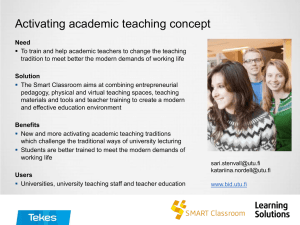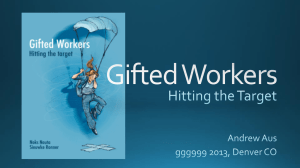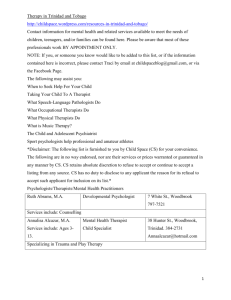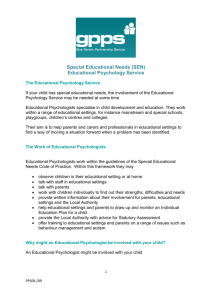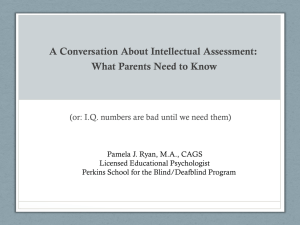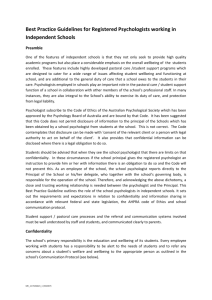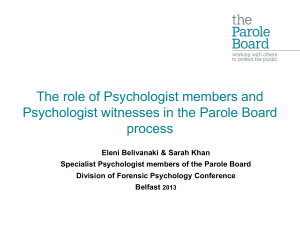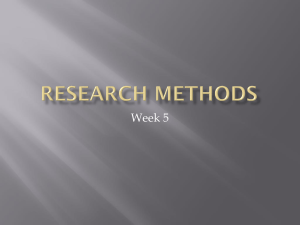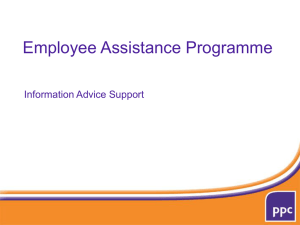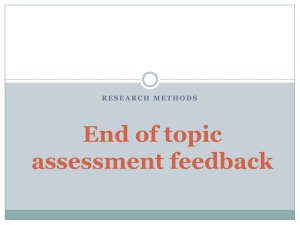Psychologist
advertisement
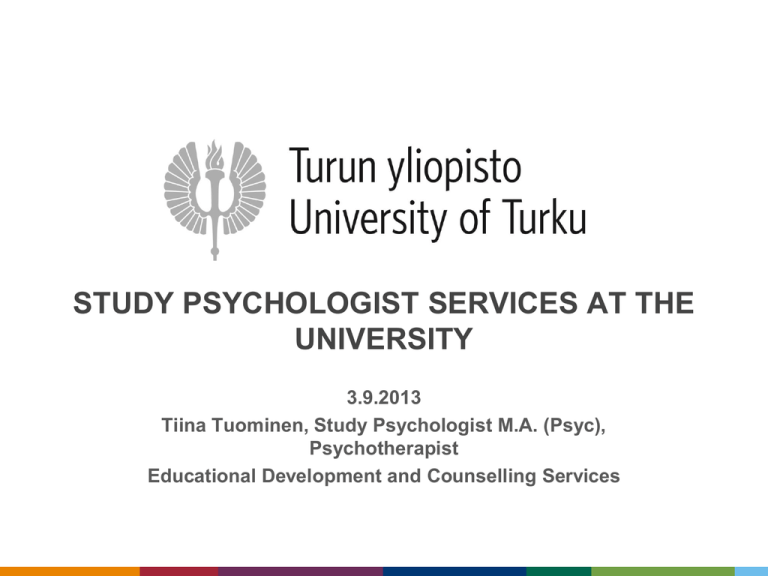
STUDY PSYCHOLOGIST SERVICES AT THE UNIVERSITY 3.9.2013 Tiina Tuominen, Study Psychologist M.A. (Psyc), Psychotherapist Educational Development and Counselling Services AGENDA OF THE PRESENTATION - Study psychologist service or study counselling psychologist service - Challenges of the University Studies - Academic requirements - Learning and motivation 3/9/2013 STUDY PSYCHOLOGIST Ari Kaukiainen (45%) Tiina Tuominen (60%) Karri Kauppinen (trainee, until 31.Dec) 3/9/2013 HOW TO CONTACT? Apply a form (in finnish however) in: https://intranet.utu.fi/fi/Yksikko/opintopsykologit oiminta/Sivut/home.aspx Tiina Tuominen: tituomi@utu.fi Ari Kaukiainen: ari.kaukiainen@utu.fi Karri Kauppinen (trainee) karripekka.kauppinen@utu.fi 3/9/2013 Intranet – Services (palveluhakemisto) – Students (opiskelijalle) – Wellbeing – Study Psychologist (opintopsykologi) – contact form (yhteydenottolomake) 3/9/2013 STUDY PSYCHOLOGIST SERVICES - Study counselling psychology - Special guidance and counselling in questions related to learning, studying, life management, and wellbeing - Services for students with disabilities and for students with special needs - The sessions with the Study Psychologist are confidential and last about 45 minutes. - There are usually 1-5 sessions per student 3/9/2013 STUDENT CAN CONTACT FOR EXAMPLE IN THE FOLLOWING MATTERS: - Studies that have come to a standstill Problems with progressing in studies Study-related self-confidence Motivation issues Coping with stress and tension Returning to studies after a long break 3/9/2013 STUDENT CAN CONTACT FOR EXAMPLE IN THE FOLLOWING MATTERS (2): - Other issues related to learning, such as exam or thesis anxiety, time management, learning disabilities, problems with writing process - Moving abroad, new country, new social network, new culture - Stresfull phase of life 3/9/2013 UNIVERSITY STUDENT AS A CLIENT - Consultative work, clinical psychology (capability of studying, psychological wellbeing, assessing the need of therapy, supportive ”short therapy”, treatment interventions) - The groups: according to thesis, continuing the studies, those with tension about appearance or given presentation… - Training of students (tutors, peer students) - Introduction lectures, lectures about study techniques 3/9/2013 UNIVERSITY STAFF AS A CLIENT - Training (pedagogic training) - Consultation about student counselling matters - Develop and maintain good practise in University community 3/9/2013 - Working with Interestgroups such as FSHS, Finnish Student Health Service (YTHS), The student union (Tyy) - Projects (reading & writing problems, How to discuss about the difficult matters?) - National student psychologist network 3/9/2013 STUDYING AT THE UNIVERSITY - Academic freedom vs. academic responsibility - Diminished supervision - Study planning in one´s own - Academic reasoning, critical thinking - Lectures: how to make good use of that? 3/9/2013 THE STUDY ABILITY MODEL SOURCE: KRISTINA KUNTTU (2008). SUOMEN LÄÄKÄRILEHTI, 37, S. 3020. Personal resources Personality (emotion regulation, Self-concept) Identity, life management Life situation and conditions Social relations Physical and mental health Study ability Study environment Physical, social and Psychological environment Educational institutions Students own communities Study skills Study orientation Study techniques Study motivation Critical thinking Study styles and habits Problem-solving skills Social skills Study plan formulation Time planning Metacognitive skills Teaching Teaching and guidance Pedagogical competence Tutoring 3/9/2013 STUDY ABILITY (”SUMMARY”) - Appropriate study strategies - Study rhythm and study routine: A good day to study. - Obvious: Remember to eat, sleep and exercise! - Motivation has to be maintained - Emotion regulation: frustration toleration - Realistic goals (anxiety of being tired) 3/9/2013 ACADEMIC REQUIREMENTS - Good study skills Self regulation (time use) Maintaining motivation Interaction skills and social skills Team work skills (collegues, work mates) Writing skills (process writing),Research skills 3/9/2013 GOOD STUDY SKILLS - Learning strategies Problem solving skills Critical thinking Constructive learning Objective processing Social skills Time management 3/9/2013 LEARNING IS A CONSTRUCTIVE PROCESS - How to react in study situations? - What is your orientation to studies? - What you think about learning? Is it active or passive? - Own responsibility about learning: Have I learned? Is it right? 3/9/2013 Learn! Long-term memory Activate schemas Own construction about the learned matter Motivation and metacognitive skills controlls the action of the cycle Setting goals Learning strategies Monitor your understanding process! 3/9/2013 SELF REGULATION - Timetables, schedules Working days – holidays How to cope or manage stress? Negative emotions Developing persistence Turning points in life (moving abroad, maturation, responsibility) - Friends and social life 3/9/2013 MOTIVATION - Has to be maintained Grow your interest Feelings of control and mastery Feelings of failure Why am I doing this? What are my goals? How to reach my goals? How to get there? 3/9/2013 3/9/2013 PROCRASTINATION It would be fine to do the work in time BUT - Avoid doing the work - Avoid unpleasant things - Doing something else - Doing slowly, eventually in a hurry - Can´t do it at all 3/9/2013 WHAT TO DO OTHER THAN PROCRASTINATE? - Set reasonable goals (cut them smaller) Make it pleasant Grow your motivation Rest, recover Grow your self-confidence Trust yourself Reward yourself Acknowledge your study environment 3/9/2013 6 TIPS - Keep up the good state of study: study with regularity and take time to recover - Make good use of social networks - Update your study techniques - Learn to evaluate what you have learned - Take the rough with the smooth, don´t give up - Analyze your past week, has it gone the way you wanted, comparing what you think highly of? 3/9/2013 THANK YOU! Tiina Tuominen, PsM, Study Psychologist Psychotherapist E-mail: tituomi@utu.fi, tel. (02) 3338519 Educational Development and Counselling Services, University of Turku PRACTICE: Publicum Centre for Learning Research (room 426) 3/9/2013
